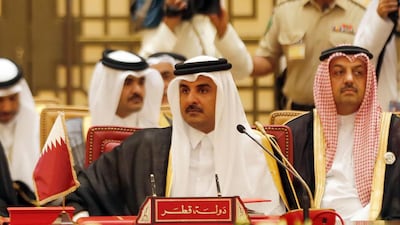The Gulf Cooperation Council summit, scheduled to take place in Kuwait in December, will most likely be postponed until mid-2018, according to regional reports.
Major Saudi newspaper Okaz reported on Sunday that the summit will most probably be pushed back another six months due to the ongoing dispute between Qatar and the four Arab countries boycotting it.
"Postponing [the summit] aims to remove disputes and resolve the crisis that has erupted because of Qatar's lack of commitment to the 2013 Riyadh Agreement and the 2014 Supplemental Agreement," a source told Okaz daily. "Postponing the summit was a Kuwaiti suggestion, and Kuwait has not yet received an answer from the other countries."
Saudi Arabia, the UAE, Bahrain and Egypt cut all diplomatic and transport ties with Qatar over its support and financing of extremist groups and interfering in the internal affairs of other countries. Doha denies the accusations.
The conflict erupted in June, but the tensions with Qatar have been there for years and Qatar pledged to change its behaviour when it signed documents with other GCC members in 2013 and 2014.
Kuwaiti newspaper Al Rai reported that the regional meeting will most probably be postponed due to the "lack of progress in resolving the Gulf crisis".
It will be postponed for six months "unless there is a big political breakthrough after the visit of US secretary of state Rex Tillerson to Riyadh to take part in Saudi-Iraqi co-ordination council meeting … after which he will visit Doha and other Asian countries," a gulf diplomat told Al Rai.
However, he added: “There are no strong indicators there will be a solution soon.”
Kuwait has mediated to try and resolve the conflict, and the United States, Turkey and Europe have all looked for a way to resolve it during visits by top officials to the countries involved.
_______________
Read our essential backgrounder on the Gulf dispute here: Qatar crisis — What you need to know
_______________
Mr Tillerson launched a new bid on Sunday to ease tension between Riyadh and Doha, both of which are allies of Washington.
However, even before he arrived at Riyadh's King Salman airbase on Saturday, Mr Tillerson indicated there was little progress.
"I do not have a lot of expectations for it being resolved anytime soon," he said in an interview Bloomberg.
"There seems to be a real unwillingness on the part of some of the parties to want to engage."
Kuwait and Oman — both of which are members of the GCC along with Saudi Arabia, UAE, Bahrain, and Qatar — have not taken part in the Qatar boycott.
The four Arab countries stand firm by their decision to boycott Qatar, saying they are willing to re-establish communication with Doha only if it adheres to regional and international agreements as well as the demands and principles issued by the quartet.
Doha has so far refused to meet the quartet's 13 demands, which included the closure of Qatar-owned Al Jazeera news channel — which the quartet says provides a platform for extremists and dissidents — and the shutting down of a permanent Turkish military base in the country.

